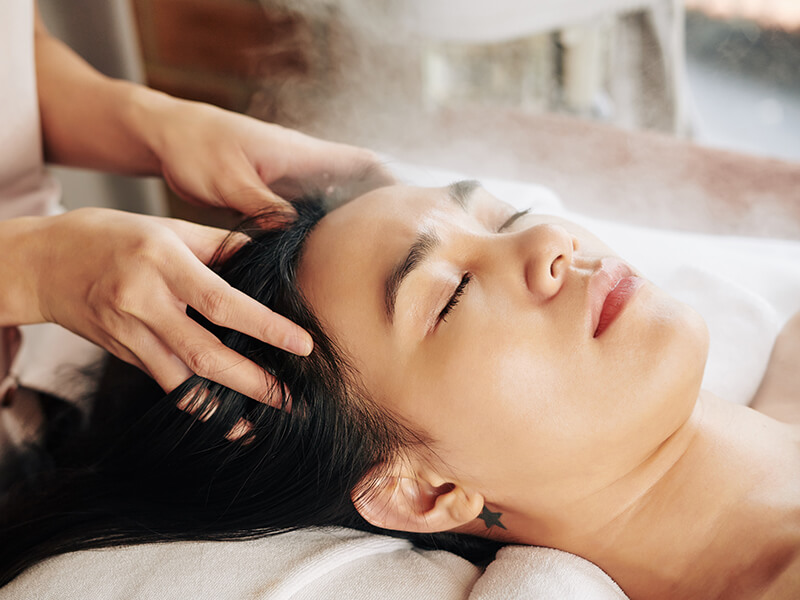Receiving a scalp massage at the end of your massage session can be a profoundly relaxing and soothing experience. This service also provides several other physical and mental health benefits!
What To Expect
Scalp massage is generally added to regular massage services. Towards the end of your session, the massage therapist will take special care and extra time massaging your scalp, neck, and face. This massage may include the use of oil drizzled onto the scalp. It’s best to schedule your massage with a scalp massage add-on at the end of the day or on a day where you have no plans to follow, so you have the chance to go home and wash your hair.
Benefits
Scalp massage can stimulate hair growth and thickness by stretching the hair follicle and dilating the blood vessels. Scalp massage increases blood circulation and sebum production. Regular scalp massage at 15-20 minutes per day can offer incredible results for your hair and scalp health. Scalp massage can ease tension, headache, and migraine pain by soothing the muscles that become tight during an episode. By manipulating the scalp muscles, you may experience immense relief from your migraine or headache symptoms. Scalp massage may lower blood pressure by dilating the blood vessels of the head and neck. Lowering your blood pressure decreases the risk of heart attack and stroke. The delicate manipulation of the scalp and surrounding areas can promote a sense of relaxation and wellbeing, promoting the release of oxytocin, serotonin, and dopamine into the brain. These chemicals are responsible for elevating mood.
Contraindications
Scalp massage should be avoided when open sores, wounds, abrasions, rash, or inflamed skin conditions are present. Those with osteoporosis, epilepsy, deep vein thrombosis, clotting conditions, severe or uncontrolled diabetes, spinal cord damage, neck injury, and heart conditions should avoid massage. Be sure to discuss any concerns with your massage therapist prior to receiving a scalp massage.
Frequency
Scalp massage can be performed safely at every massage appointment, should you choose. Scalp massage is generally considered safe for most people.
Aftercare
If your massage therapist uses oil on your scalp, you will want to wash your hair before bed to prevent staining of your sheets and pillowcases. You may experience scalp tenderness or soreness. Avoid putting your hair in tight ponytails or other hairstyles that may put a strain on your hair follicles. Tenderness should subside within 24 hours. You may notice more hair loss than usual when washing your hair. This is not cause for concern, as scalp massage encourages proper shedding and regrowth. You may notice your hair becomes more oily after a scalp massage. Scalp massage can stimulate proper sebum production. Once your scalp becomes used to regular scalp massage, your sebum production should rebalance. Avoid over-shampooing your hair and allow your follicles to adjust naturally.
